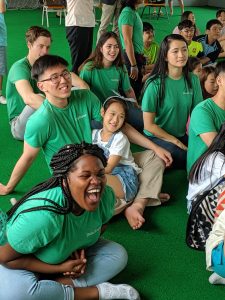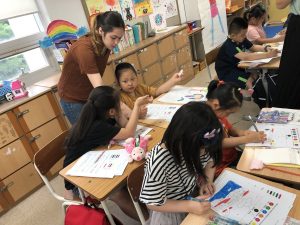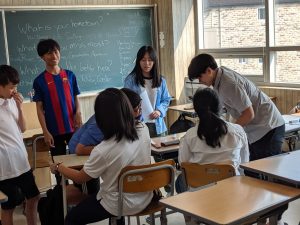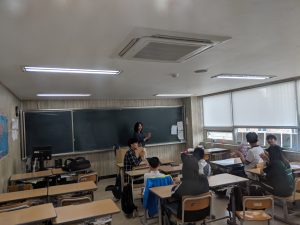A week has passed since we said goodbye to Korea. It feels like a dream. While fighting jet lag, I have had time to rest, eat home food, and tell my family and friends about this summer. I am very grateful for having been given the opportunity to partake in this program. I have never felt that two months could be so meaningfully spent. Besides the experience of living in a country that is far from home, what made it really special was the people I met through this experience.
Gwangju and Ganghwado
On the last week of the program, we visited Gwangju, the capital of Jeolla province, which was a 3-hour-drive from Seoul. Days before the trip, we all watched a Korean movie named “A Taxi Driver”. It captures the tragedy of the May 18 Gwangju Uprising through the eyes of a taxi driver, and it served as a good lead-in to a historical event that we would learn more about in Gwangju. Gwangju was quiet and undisturbed, which shockingly contrasted the footage of the violence from 1980, when the police brutally attacked the protesters demonstrating against martial law. To conclude the excursion, we had the privilege of saluting the deceased citizens at the May 18th National Cemetery.

Entrance to the May 18th National Cemetery.
The sign says ‘민주의 문’, which translates to ‘Door of Democracy’.
On Thursday, we went on a day-trip to Ganghwa Island, located in the Northwest. We did a lot of walking, and we got to appreciate the diverse architecture, which included a fortress and an Anglican catholic church. We were also in close proximity to North Korean territory and in fact we could see their farmlands from particular spots on the island.
This week helped us appreciate Korea’s rich culture and history even more. We had time to reflect upon our seven weeks in Seoul as well as spend valuable time with our professors.

Students in front of the Provincial Office, site of protesting and fighting in the 1980 Gwangju Uprising.
Reflecting on Teaching
The true highlight of these eight weeks was teaching the students at Jiguchon and Woorideul. Each group we taught presented us with various challenges and unique senses of achievement.
Jiguchon School
Despite being only one year apart, second and third grade at Jiguchon were very different. Second grade was perhaps the hardest class to manage, due to the size and the rowdy behavior of the children. Most of the time, we struggled to gain their attention, and I think games were most effective with this group. Third grade, on the other hand, was disciplined and relatively more interested in learning English. All of the kids were lovely and welcomed us each day with smiles and excitement. We tried our best to reciprocate that positive energy with enthusiasm.
Teaching the multicultural class was also a joy. These students have spent the least amount of time in Korea, and it has been an honor to teach them during their process of adaptation to living in a foreign country and learning Korean. Sixth grade was the first class we taught, and we realized right away that some of the games we had prepared were not adequate. Despite spending the least amount of time teaching this group, I think I was closest to them, and by the end of our time at Jiguchon I saw them like younger brothers and sisters.
Finally, middle school. These students are perhaps the ones who have it the hardest. Some of their stories shocked me, and it is touching to see that even through hardship these students are still coming to school, developing relationships with their teacher, and having friends to have fun with and rely on. This group of students exhibit great camaraderie. It is a pleasure to see how they are all trying to help each other out. I remember how some of the students who were more comfortable with English or Korean would translate for the classmates to help them understand and follow what we were saying. We spent the most time with these students, and they hold a special place in our hearts. I will fondly remember talking about feeling “out of place” with my students. We will always be rooting for you!

Group photo on our final day with Jiguchon Middle
Woorideul School
Our last two weeks at Woorideul were just as meaningful. My preconceived notion of North Korean defectors was proved wrong. The students I worked with were around the same age as me, and it was surprisingly easy to connect with them. We had similar interests and a shared humor code. I feel like I made long-lasting friendships with them. Even if I don’t see them again, my only hope is that these students do not forget us, as we will not.
It was inspiring to see how the students at Woorideul, despite being in a position of disadvantage (due to their life circumstances and their educational background), have goals and are working hard to achieve them. They are applying for college, searching internships, and studying English to pass their General Education exam. Their motivation is something I should learn from.

Introducing ourselves to Woorideul School
The administration and the teachers in both schools also deserve recognition. They welcomed us into an unfamiliar environment, and did their best to make us feel entitled to be teachers. Thank you for being an inspiration, your job is truly admirable.
Final Thoughts
The lectures at the Unification Center, the guided visits to different museums and the weekly group meetings have expanded my knowledge and interest on the themes proposed by the Duke Engage South Korea program. While engaging in different activities, I was constantly invited to think about topics on North Korean politics and immigration in South Korea. I know much more but at the same time I leave with many unanswered questions.
On the last day at the airport, Thomas asked what our favorite moment of this trip was. In retrospect, it is very hard to pick out a single moment. These two months have been enriching in so many facets. I half-jokingly said that my favorite moment was when we were lesson planning as a group. Despite the stress involved in making decisions as a group of eight, I chose this moment because the main reason why this experience has been a success was the group itself.
Living in the same house for eight weeks and spending most of the day teaching, eating, lesson planning and exploring the city together takes something special. Frustrations obviously arose from time to time, but in definitive terms we all cared about each other. Even if we sometimes jokingly denied it, I think we all really did enjoy each other’s company. By the end of this trip, I feel that we are like a family. This is why I say thank you to Erin, Daniel, Emily, Shey, Martin, Thomas and Nikki and why I say that it has been a privilege to spend the summer with you. I also want to thank our professors for caring for us and pushing us to do better. Thank you for your patience, and for all the work you put behind the scenes. We truly appreciated your guidance.
Beyond the practical goals of volunteer service (teaching the alphabet, providing resources), I believe I underestimated the value of community engagement before this summer. After spending weeks with our community partners (mostly students), I came to realize how impactful interacting with the community can be. By sharing experiences, expressing our worries and talking about our interests, we realized we all had much more in common than I had expected.
If someone told me to predict what this experience would have been like two months ago, not even half of it would be true. I think that is what made this trip so special. I encountered a lot of emotions that I would not have expected to come across. I leave Korea perhaps taking more from it than what I had to give. Hopefully, it has been the same for our students.
So thank you to all the people who made DESK2019 a memory that I will forever treasure!~
— Le





